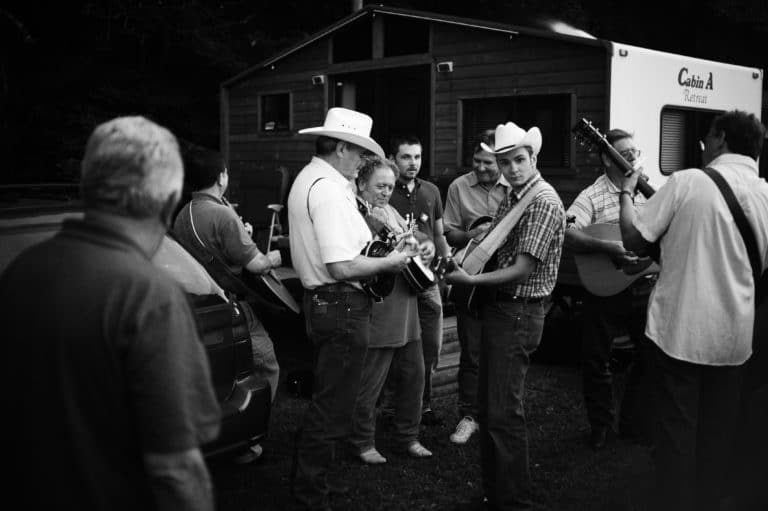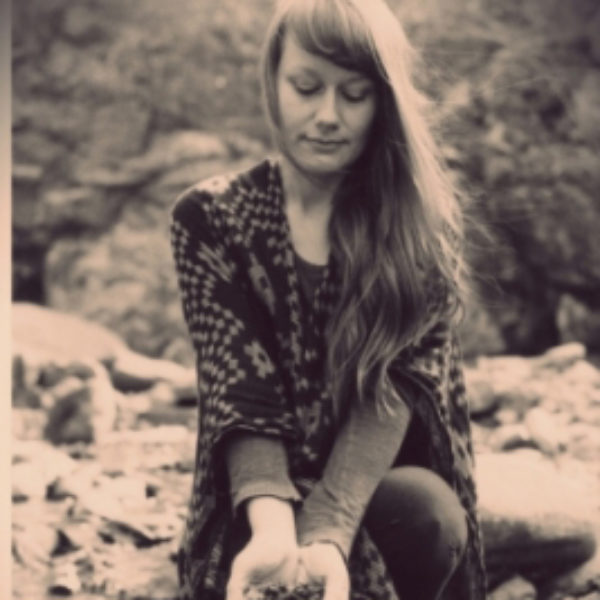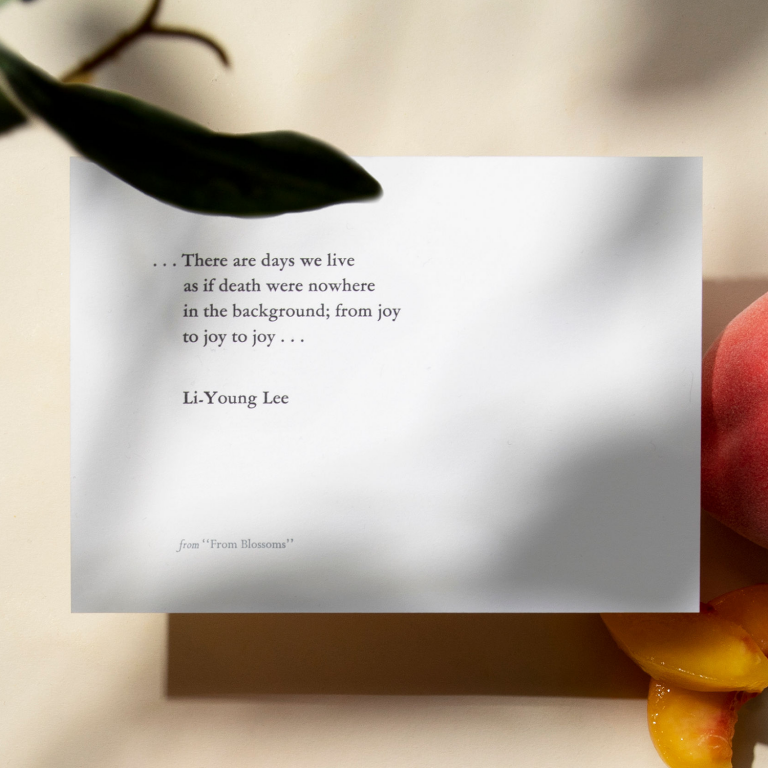
Image by David Mello/Flickr, Attribution-NoDerivs.
The Thread of All Sorrows
When the news of the shooting hits, suddenly we are all Southerners again, under one same long shadow.
If I was not a Southerner yesterday, or had forgotten that I was, I am today, again, as I have been so many times when this past that is never dead, this past that is not even past, comes back to live with us.
There are so many souths, and where I live now, in Roanoke, Virginia, is just one south, different from the south I am from, East Tennessee, which is different from the south of South Carolina. But I am grieving today for The One South and the circumstances under which it once rallied as one, the Confederacy, in a gruesome war in defense of slavery, and the way in which we now, all of us, in the Blue Ridge, and the Smoky Mountains, and the Piedmont, and the Cumberland Plateau, and the Mississippi Delta, and the cypress swamps, and the hill country, and the Bluegrass region, and the Gulf ports, and the tidal flats, fall under this long shadow of shame. I am grieving for the ways that we are still at war.

I grieve in the light of day, in broad daylight, under a blaring sun, hot, the kind of sun that enslaved Africans bent and labored under in the tobacco fields, and later, the cotton fields, the old South an empire of soil and sun and the sweat of black folks.
I say that I am grieving to tell you that I am crying, and the tears and the sun are a combination of heat and sting that don’t serve to make me, the white Southerner, feel anything close to the hot sting felt by black slaves and their descendants, but that I am trying to know that grief that is leaking out all around me, and that my tears tell me that somehow I am a part of it, that it is in me too.
I have read that when slaves first arrived on the ships from Africa and were sold at the ports in Jamestown, and in Charleston, their bodies were rubbed with palm oil to give them a healthy appearance. Greased, like machines, like shining new implements, the tools that would be used to build a nation in the throes of empire-building. It was a nation growing from seed — I think of the seeds shared by the native Powhatan people who inhabited what the white men called Virginia (and the mythos of virgin land embedded in that name), seeds of maize, and tobacco, that sacred plant of the Natives that became the first major commodity in the fledgling capitalist empire.
Seeds shared by those who were being killed and pushed out for their land, and seeds grown and cultivated by black men and women who had been taken by force or coercion from another land (from which they brought other seeds, their watermelon seeds, and their okra, those summer vegetables that Southerners of all races now grow and love). Black men and women were brought here as slaves to do the work that would make the white, seed-holding, slave-owning white man rich; black men and women toiling under the hot sun for the white man. The slaves would grow the empire, would grow the cotton to clothe us.

I grieve under the same sun that sprouted those first seeds of empire and drew the first beads of sweat from the brows and backs of black men and women in the sunny South, where things grew, where it was warm, where the soil was good, and fertile, and so where the slaves were sent. Under the same sun that after the Civil War and the Emancipation Proclamation still came up each morning and went down in the evenings, turning the blue sky purple, as bruises, until it was full dark and white men hid their faces in that dark, (hiding and yet not needing to hide, white hoods glowing in the dark like tufts of white cotton on the plants in the fields) and did terrible things, so that the sun each morning lit up black bodies that had been hanged and burned the night before. We dare not speak of this now, dare not speak these words. That is a South that seems distant to us — and yet it is always close, always too close, brought closer to us in times like these.

We do not grieve these things in the broad daylight, under the sun, not crying out loud, or wailing in the streets, but with a hot boiling silence somewhere deep, deep under the skin. The reality television shows about us reveal that we the white Southerners are degraded, defiled; we are vile — our crimes unspoken, and yet there is our punishment, a sour loss turned inward, a self-hatred that festers, proud.
The time for sour pride, for the blind waving of a blood-stained flag, is over. Did we need a Dylann Roof to show us this?
Why can we not root out the seed of our grief?
Why will we not bring these things into the light?

“Before you know kindness as the deepest thing/ inside, / you must know sorrow as the other deepest thing. / You must wake up with sorrow,” writes the poet Naomi Shihab Nye.
I have said his name but not theirs.
Clementa Pinckney. Tywanza Sanders. Cynthia Hurd. Sharonda Coleman-Singleton. Myra Thompson. Ethel Lance. Daniel Simmons. DePayne Middleton-Doctor. Susie Jackson. We, all of us — but some more than others — have woken up with sorrow, again, and again, and again, and again, the sun has gone down and risen on us. And now it is time for kindness.
Kindness: the deepest thing inside, the kind of seed that is watered by sorrow, grown in the light of sorrow.

So that we can grow kindness, we have to pour out this grief, bring it out into the light, and share in it. But we are not so good at sharing sometimes, maybe it has to do with our perceived losses, our perception of lack, a kind of post-war poverty of spirit that haunts us, a belief that the pie isn’t big enough to go around (“You’re taking over our country,” he said before the shots rang out.). I think of the country, where I am from, and all of its NO TRESPASSING signs, which lead me now in my mind to those words I would recite with others on Sundays in the Methodist church: Forgive us our trespasses as we forgive those who have trespassed against us.
A black man will not be forgiven as readily as a white man for slipping fences. A black man is much less likely than a white man to own land, or a house.

The shooter entered a church that opened its doors to him, a church that welcomed him, a young white man, though Emanuel African Methodist Episcopal Church was first established as a refuge in the city of Charleston, away from the white slave-drivers, where blacks could pray, a house of worship, a place to give oneself to God and to talk privately with that god, a place to sing, or cry, out of the harsh streets, out of the broad daylight. For public spaces like streets and swimming pools and sidewalks are not inhabited as easily, as comfortably, by blacks as they are by whites, and this refuge was important in a world where police still stalk the bodies of black men and women, as if by walking down the street they are trespassing already.
To trespass is to enter unlawfully upon the land of another, but it also means to violate the rights and dignity of another human being. I wonder if we haven’t forgiven too easily those flag-wavers who continue to cultivate a legacy of bigotry, if we haven’t respected the right to wield hateful symbols — the psychological tools of oppression — above the right to live in a world free of the symbols that are used to oppress human souls.

And yet today the victims’ families are praying for the shooter’s forgiveness. From a courtroom, they are looking at him on a video screen, looking into his eyes and saying, “I forgive you. Have mercy on your soul.” They are praying, As we forgive those who have trespassed against us… They, descendants of the slaves who planted and grew the first seeds of empire, upon whose backs it was built, by whose sweat it was built, they who have endured more than their share of inherited sorrow, are still the ones working — tilling the soil and hoeing the rows and planting the seeds and tending the plants and sharing the bounty of kindness. Watering fields of kindness with their tears, forgiveness coming down like fresh rain, and I wonder how long whites will leave even this hard work of kindness to those who have reaped the sorrow, who carry sorrow in their hearts like full bushel baskets, heavy with the accumulated weight.

We in the One South, under the one long shadow that unites us, must all carry this load of sorrow now, as never before, if we are to build an empire of kindness. We must all do this work, stand together under the same sun and haul up this grief, plant new seeds. And there are things that need weeding out, like the Dylann Roofs among us, whose growth can no longer be tolerated, who we cannot continue to nurture. There are noxious legacies that must be eradicated, like that flag that some defenders who talk of freedom but not kindness have called “just a piece of cloth.”
Naomi Shihab Nye writes:
“You must wake up with sorrow. / You must speak to it till your voice / catches the thread of all sorrows/ and you see the size of the cloth. / Then it is only kindness that makes sense / anymore.”
When I wake up in the morning, I ride my bicycle to the river and see, under a bridge, spray-painted in black, as if it is 1863, Slavery is Over! In this past that is never dead, this past that is not even past, it is not just a piece of cloth but the thread of all sorrows. Waking up, we must see the size of the cloth, and begin, again, to unravel it.



Share your reflection